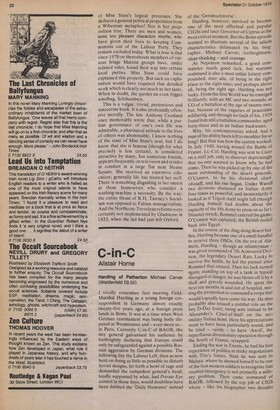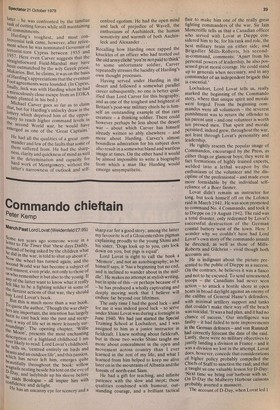C-in-C
Alistair Horne
Harding of Petherton Michael Carver (Weidenfeld £8.50) I vividly remember first meeting FieldMarshal Harding as a young foreign correspondent in Germany almost exactly twenty-five years ago, at a foreign press lunch in Bonn. It was at a time when West German rearmament was being hotly disputed at Westminster and — even more so — in Paris. Currently C-in-C of BAOR, the tiny general galvanised his audience by forthrightly declaring that Europe cOuld only be safeguarded against a possible Russian aggression by German divisions. The following day the Labour Left, then as now bent on doing as little as possible to disturb Soviet designs, let forth a howl of rage and demanded the outspoken general's head; loudly supported by what, had Private Eye existed in those days, would doubtless have been dubbed the 'Daily Huneater' instead of the `Getsmuchworse'.
Harding, however, survived to become one of the most effectual and popular CIGSs and later Governor of Cyprus at the most critical moment. But the Bonn episode seemed to illustrate several of the salient characteristics delineated by his biographer, Michael Carver; forthrightness, clear-thinking — and courage.
As Napoleon remarked," a good commander needs good luck, but wartime command is also a most unfair lottery compounded, inter cilia, of being in the right place at the right time; and perhaps above all, being the right age. Harding was not lucky. From the first World war he emerged brilliantly, with an MC and two wounds, as CO of a battalion at the age of twenty-two; but, because of the vagaries of peacetime soldiering and through no fault of his, 1939 found him still a battalion commander, aged forty-three and in an Indian backwater. Why, his contemporaries asked, had a man of his ability been left to moulder for so long? But that was how the system worked. In July 1940, having missed the Battle of • France, Lt.-Col. Harding was sent to Cairo on a staff job, only to discover depressingly that no-one seemed to know why he had come. Then he was picked up by one of the most outstanding of the desert generals. O'Connor, to be his divisional chiefof-staff, and his rise began. Under Wavell two divisions shattered an Italian Army four times as powerful, and momentarily it looked as if Tripoli itself might fall (though Harding himself had doubts about the capacity of the 8th Army to press on so far). Disaster struck; Rommel entered the game; O'Connor was captured; the British reeled back into Egypt.
In the course of the ding-dong desert battles, Harding became one of a small handful to receive three DSOs. On the eve of Alamein, Harding — though an infantryman — was given command of 7th Armoured Divi sion, the legendary Desert Rats. Lucky to survive the battle, he led the pursuit after Rommel that ensued. Then his luck turned again; standing on top of a tank in typical disregard of danger, he was blown off it by a shell andgravely wounded. He spent the next ten months in and out of hospital, missing the promotion to command a corps that would logically have come his way. He thus probably also missed a combat role on the key D-Day front; being sent instead to be Alexander's Chief-of-Staff on the sec ondary Italian front. Here his appreciations seem to have been particularly sound, and he tried — vainly — to have 'Anvil', the superfluous diversionary operation through th South of France, scrapped. Ending the war in Trieste, he had his first experience of politics in tricky negotiations with Tito's forces. Next he was sent to Malaya, where he showed himself to be one of the first western soldiers to recognise that counter-insurgency is not primarily a milit.ary problem. Then came command of BAOR, followed by the top job of CIGS where — like his biographer two decades later — he was confronted by the familiar task of cutting forces while still maintaining all commitments. Harding's toughest, and most controversial task came, however, after retirement when he was nominated Governor of terrorist-torn Cyprus between 1955 and 1957. Here even Carver suggests that the straightforward Field-Marshal may have been outmatched by the wily Greek priest, Makarios. But, he claims, it was on the 'basis of Harding's appreciations that the eventual Foot agreements were founded. (In cyprus, finally, luck was with Harding when he had a miraculously close escape from an EOKA bomb planted in his bed.) Michael Carver goes so far as to claim that, but for Harding's unlucky draw in the lottery which deprived him of the opportunity to reach higher command levels in the second World war, he would have emerged as one of the 'Great Captains.'
He had all the qualities of a great commander and few of the faults that some of them suffered from. He had the sharpness, clarity and quickness of mind as well as the determination and capacity for hard work of Montgomery, without the latter's narrowness of outlook and self centred egotism. He had the open mind and lack of prejudice of Wavell, the enthusiasm of Auchinleck, the human sensitivity and warmth of both Auchinleck and Alexander . . .
Recalling how Harding once rapped the knuckles of an officer who had trotted out the old army cliché 'you're not paid to think' to some unfortunate soldier, Carver repeatedly stresses the lucidity of Harding's own thought processes. Having served under Harding in the desert and followed a somewhat parallel career subsequently, no one is better qualified than Lord Carver for this biography, and as one of the toughest and brightest of Britain's post-war military chiefs he is himself an outstanding example of that rare creature — a thinking soldier. There could however perhaps be less about the desert war — about which Carver has himself already written so ably elsewhere — and more about Harding. Carver's almost boundless admiration for his subject does also result in a somewhat bland and wartless image at times. On the other hand it would be almost impossible to write a biography from which a man like Harding would emerge unsympathetic.







































 Previous page
Previous page